- Home
- Roald Dahl
Skin and Other Stories Page 4
Skin and Other Stories Read online
Page 4
'Wouldn't dream of it,' Sergeant Noonan said.
'Please,' she begged. 'Please eat it. Personally I couldn't touch a thing, certainly not what's been in the house when he was here. But it's all right for you. It'd be a favour to me if you'd eat it up. Then you can go on with your work again afterwards.'
There was a good deal of hesitating among the four policemen, but they were clearly hungry, and in the end they were persuaded to go into the kitchen and help themselves. The woman stayed where she was, listening to them through the open door, and she could hear them speaking among themselves, their voices thick and sloppy because their mouths were full of meat.
'Have some more, Charlie?'
'No. Better not finish it.'
'She wants us to finish it. She said so. Be doing her a favour.'
'Okay then. Give me some more.'
'That's the hell of a big club the guy must've used to hit poor Patrick,' one of them was saying. 'The doc says his skull was smashed all to pieces just like from a sledgehammer.'
'That's why it ought to be easy to find.'
'Exactly what I say.'
'Whoever done it, they're not going to be carrying a thing like that around with them longer than they need.'
One of them belched.
'Personally, I think it's right here on the premises.'
'Probably right under our very noses. What you think, Jack?'
And in the other room, Mary Maloney began to giggle.
The Sound Machine
It was a warm summer evening and Klausner walked quickly through the front gate and around the side of the house and into the garden at the back. He went on down the garden until he came to a wooden shed and he unlocked the door, went inside and closed the door behind him.
The interior of the shed was an unpainted room. Against one wall, on the left, there was a long wooden workbench, and on it, among a littering of wires and batteries and small sharp tools, there stood a black box about three feet long, the shape of a child's coffin.
Klausner moved across the room to the box. The top of the box was open, and he bent down and began to poke and peer inside it among a mass of different-coloured wires and silver tubes. He picked up a piece of paper that lay beside the box, studied it carefully, put it down, peered inside the box and started running his fingers along the wires, tugging gently at them to test the connections, glancing back at the paper, then into the box, then at the paper again, checking each wire. He did this for perhaps an hour.
Then he put a hand around to the front of the box where there were three dials, and he began to twiddle them, watching at the same time the movement of the mechanism inside the box. All the while he kept speaking softly to himself, nodding his head, smiling sometimes, his hands always moving, the fingers moving swiftly, deftly, inside the box, his mouth twisting into curious shapes when a thing was delicate or difficult to do, saying, 'Yes ... Yes ... And now this one ... Yes ... Yes. But is this right? Is it - where's my diagram? ... Ah, yes ... Of course ... Yes, yes ... That's right ... And now ... Good ... Good ... Yes ... Yes, yes, yes.' His concentration was intense; his movements were quick; there was an air of urgency about the way he worked, of breathlessness, of strong suppressed excitement.
Suddenly he heard footsteps on the gravel path outside and he straightened and turned swiftly as the door opened and a tall man came in. It was Scott. It was only Scott, the doctor.
'Well, well, well,' the Doctor said. 'So this is where you hide yourself in the evenings.'
'Hullo, Scott,' Klausner said.
'I happened to be passing,' the Doctor told him, 'so I dropped in to see how you were. There was no one in the house, so I came on down here. How's that throat of yours been behaving?'
'It's all right. It's fine.'
'Now I'm here I might as well have a look at it.'
'Please don't trouble. I'm quite cured. I'm fine.'
The Doctor began to feel the tension in the room. He looked at the black box on the bench; then he looked at the man. 'You've got your hat on,' he said.
'Oh, have I?' Klausner reached up, removed the hat and put it on the bench.
The Doctor came up closer and bent down to look into the box. 'What's this?' he said. 'Making a radio?'
'No, just fooling around.'
'It's got rather complicated-looking innards.'
'Yes.' Klausner seemed tense and distracted.
'What is it?' the Doctor asked. 'It's rather a frightening-looking thing, isn't it?'
'It's just an idea.'
'Yes?'
'It has to do with sound, that's all.'
'Good heavens, man! Don't you get enough of that sort of thing all day in your work?'
'I like sound.'
'So it seems.' The Doctor went to the door, turned, and said, 'Well, I won't disturb you. Glad your throat's not worrying you any more.' But he kept standing there looking at the box, intrigued by the remarkable complexity of its inside, curious to know what this strange patient of his was up to. 'What's it really for?' he asked. 'You've made me inquisitive.'
Klausner looked down at the box, then at the Doctor, and he reached up and began gently to scratch the lobe of his right ear. There was a pause. The Doctor stood by the door, waiting, smiling.
'All right, I'll tell you, if you're interested.' There was another pause, and the Doctor could see that Klausner was having trouble about how to begin.
He was shifting from one foot to the other, tugging at the lobe of his ear, looking at his feet, and then at last, slowly, he said, 'Well, it's like this ... the theory is very simple really. The human ear ... you know that it can't hear everything. There are sounds that are so low-pitched or so high-pitched that it can't hear them.'
'Yes,' the Doctor said. 'Yes.'
'Well, speaking very roughly any note so high that it has more than fifteen thousand vibrations a second - we can't hear it. Dogs have better ears than us. You know you can buy a whistle whose note is so high-pitched that you can't hear it at all. But a dog can hear it.'
'Yes, I've seen one,' the Doctor said.
'Of course you have. And up the scale, higher than the note of that whistle, there is another note - a vibration if you like, but I prefer to think of it as a note. You can't hear that one either. And above that there is another and another rising right up the scale for ever and ever and ever, an endless succession of notes ... an infinity of notes ... there is a note - if only our ears could hear it - so high that it vibrates a million times a second ... and another a million times as high as that ... and on and on, higher and higher, as far as numbers go, which is ... infinity ... eternity ... beyond the stars.'
Klausner was becoming more animated every moment. He was a frail man, nervous and twitchy, with always moving hands. His large head inclined towards his left shoulder as though his neck were not quite strong enough to support it rigidly. His face was smooth and pale, almost white, and the pale-grey eyes that blinked and peered from behind a pair of steel spectacles were bewildered, unfocused, remote. He was a frail, nervous, twitchy little man, a moth of a man, dreamy and distracted; suddenly fluttering and animated; and now the Doctor, looking at that strange pale face and those pale-grey eyes, felt that somehow there was about this little person a quality of distance, of immense immeasurable distance, as though the mind were far away from where the body was.
The Doctor waited for him to go on. Klausner sighed and clasped his hands tightly together. 'I believe,' he said, speaking more slowly now, 'that there is a whole world of sound about us all the time that we cannot hear. It is possible that up there in those high-pitched inaudible regions there is a new exciting music being made, with subtle harmonies and fierce grinding discords, a music so powerful that it would drive us mad if only our ears were tuned to hear the sound of it. There may be anything ... for all we know there may -'
'Yes,' the Doctor said. 'But it's not very probable.'
'Why not? Why not?' Klausner pointed to a fly sitting on a small roll of copper
wire on the workbench. 'You see that fly? What sort of noise is that fly making now? None - that one can hear. But for all we know the creature may be whistling like mad on a very high note, or barking or croaking or singing a song. It's got a mouth, hasn't it? It's got a throat?'
The Doctor looked at the fly and he smiled. He was still standing by the door with his hands on the doorknob. 'Well,' he said. 'So you're going to check up on that?'
'Some time ago,' Klausner said, 'I made a simple instrument that proved to me the existence of many odd inaudible sounds. Often I have sat and watched the needle of my instrument recording the presence of sound vibrations in the air when I myself could hear nothing. And those are the sounds I want to listen to. I want to know where they come from and who or what is making them.'
'And that machine on the table there,' the Doctor said, 'is that going to allow you to hear these noises?'
'It may. Who knows? So far, I've had no luck. But I've made some changes in it and tonight I'm ready for another trial. This machine,' he said, touching it with his hands, 'is designed to pick up sound vibrations that are too high-pitched for reception by the human ear, and to convert them to a scale of audible tones. I tune it in, almost like a radio.'
'How d'you mean?'
'It isn't complicated. Say I wish to listen to the squeak of a bat. That's a fairly high-pitched sound - about thirty thousand vibrations a second. The average human ear can't quite hear it. Now, if there were a bat flying around this room and I tuned in to thirty thousand on my machine, I would hear the squeaking of that bat very clearly. I would even hear the correct note - F sharp, or B flat, or whatever it might be - but merely at a much lower pitch. Don't you understand?'
The Doctor looked at the long, black coffin-box. 'And you're going to try it tonight?'
'Yes.'
'Well, I wish you luck.' He glanced at his watch. 'My goodness!' he said. 'I must fly. Good-bye, and thank you for telling me. I must call again sometime and find out what happened.' The Doctor went out and closed the door behind him.
For a while longer, Klausner fussed about with the wires in the black box; then he straightened up and in a soft excited whisper said, 'Now we'll try again ... We'll take it out into the garden this time ... and then perhaps ... perhaps ... the reception will be better. Lift it up now ... carefully ... Oh, my God, it's heavy!' He carried the box to the door, found that he couldn't open the door without putting it down, carried it back, put it on the bench, opened the door, and then carried it with some difficulty into the garden. He placed the box carefully on a small wooden table that stood on the lawn. He returned to the shed and fetched a pair of earphones. He plugged the wire connections from the earphones into the machine and put the earphones over his ears. The movements of his hands were quick and precise. He was excited, and breathed loudly and quickly through his mouth. He kept on talking to himself with little words of comfort and encouragement, as though he were afraid - afraid that the machine might not work and afraid also of what might happen if it did.
He stood there in the garden beside the wooden table, so pale, small, and thin that he looked like an ancient, consumptive, bespectacled child. The sun had gone down. There was no wind, no sound at all. From where he stood, he could see over a low fence into the next garden, and there was a woman walking down the garden with a flower-basket on her arm. He watched her for a while without thinking about her at all. Then he turned to the box on the table and pressed a switch on its front. He put his left hand on the volume control and his right hand on the knob that moved a needle across a large central dial, like the wavelength dial of a radio. The dial was marked with many numbers, in a series of bands, starting at 15,000 and going on up to 1,000,000.
And now he was bending forward over the machine. His head was cocked to one side in a tense, listening attitude. His right hand was beginning to turn the knob. The needle was travelling slowly across the dial, so slowly he could hardly see it move, and in the earphones he could hear a faint, spasmodic crackling.
Behind this crackling sound he could hear a distant humming tone which was the noise of the machine itself, but that was all. As he listened, he became conscious of a curious sensation, a feeling that his ears were stretching out away from his head, that each ear was connected to his head by a thin stiff wire, like a tentacle, and that the wires were lengthening, that the ears were going up and up towards a secret and forbidden territory, a dangerous ultrasonic region where ears had never been before and had no right to be.
The little needle crept slowly across the dial, and suddenly he heard a shriek, a frightful piercing shriek, and he jumped and dropped his hands, catching hold of the edge of the table. He stared around him as if expecting to see the person who had shrieked. There was no one in sight except the woman in the garden next door, and it was certainly not she. She was bending down, cutting yellow roses and putting them in her basket.
Again it came - a throatless, inhuman shriek, sharp and short, very clear and cold. The note itself possessed a minor, metallic quality that he had never heard before. Klausner looked around him, searching instinctively for the source of the noise. The woman next door was the only living thing in sight. He saw her reach down; take a rose stem in the fingers of one hand and snip the stem with a pair of scissors. Again he heard the scream.
It came at the exact moment when the rose stem was cut.
At this point, the woman straightened up, put the scissors in the basket with the roses and turned to walk away.
'Mrs Saunders!' Klausner shouted, his voice shrill with excitement. 'Oh, Mrs Saunders!'
And looking round, the woman saw her neighbour standing on his lawn - a fantastic, arm-waving little person with a pair of earphones on his head - calling to her in a voice so high and loud that she became alarmed.
'Cut another one! Please cut another one quickly!'
She stood still, staring at him. 'Why, Mr Klausner,' she said. 'What's the matter?'
'Please do as I ask,' he said. 'Cut just one more rose!'
Mrs Saunders had always believed her neighbour to be a rather peculiar person; now it seemed that he had gone completely crazy. She wondered whether she should run into the house and fetch her husband. No, she thought. No, he's harmless. I'll just humour him. 'Certainly, Mr Klausner, if you like,' she said. She took her scissors from the basket, bent down and snipped another rose.
Again Klausner heard that frightful, throatless shriek in the earphones; again it came at the exact moment the rose stem was cut. He took off the earphones and ran to the fence that separated the two gardens. 'All right,' he said. 'That's enough. No more. Please, no more.'
The woman stood there, a yellow rose in one hand, clippers in the other, looking at him.
'I'm going to tell you something, Mrs Saunders,' he said, 'something that you won't believe.' He put his hands on top of the fence and peered at her intently through his thick spectacles. 'You have, this evening, cut a basketful of roses. You have with a sharp pair of scissors cut through the stems of living things, and each rose that you cut screamed in the most terrible way. Did you know that, Mrs Saunders?'
'No,' she said. 'I certainly didn't know that.'
'It happens to be true,' he said. He was breathing rather rapidly, but he was trying to control his excitement. 'I heard them shrieking. Each time you cut one, I heard the cry of pain. A very high-pitched sound, approximately one hundred and thirty-two thousand vibrations a second. You couldn't possibly have heard it yourself. But I heard it.'
'Did you really, Mr Klausner?' She decided she would make a dash for the house in about five seconds.
'You might say,' he went on, 'that a rose bush has no nervous system to feel with, no throat to cry with. You'd be right. It hasn't. Not like ours, anyway. But how do you know, Mrs Saunders' - and here he leaned far over the fence and spoke in a fierce whisper - 'how do you know that a rose bush doesn't feel as much pain when someone cuts its stem in two as you would feel if someone cut your wrist off with a garden shea
rs? How do you know that? It's alive, isn't it?'
'Yes, Mr Klausner. Oh yes - and good night.' Quickly she turned and ran up the garden to her house. Klausner went back to the table. He put on the earphones and stood for a while listening. He could still hear the faint crackling sound and the humming noise of the machine, but nothing more. He bent down and took hold of a small white daisy growing on the lawn. He took it between thumb and forefinger and slowly pulled it upward and sideways until the stem broke.
From the moment that he started pulling to the moment when the stem broke, he heard - he distinctly heard in the earphones - a faint high-pitched cry, curiously inanimate. He took another daisy and did it again. Once more he heard the cry, but he wasn't sure now that it expressed pain. No, it wasn't pain; it was surprise. Or was it? It didn't really express any of the feelings or emotions known to a human being. It was just a cry, a neutral stony cry - a single emotionless note, expressing nothing. It had been the same with the roses. He had been wrong in calling it a cry of pain. A flower probably didn't feel pain. It felt something else which we didn't know about - something called toin or spurl or plinuckment, or anything you like.
He stood up and removed the earphones. It was getting dark and he could see pricks of light shining in the windows of the houses all around him. Carefully he picked up the black box from the table, carried it into the shed and put it on the workbench. Then he went out, locked the door behind him and walked up to the house.
The next morning Klausner was up as soon as it was light. He dressed and went straight to the shed. He picked up the machine and carried it outside, clasping it to his chest with both hands, walking unsteadily under its weight. He went past the house, out through the front gate, and across the road to the park. There he paused and looked around him; then he went on until he came to a large tree, a beech tree, and he placed the machine on the ground close to the trunk of the tree. Quickly he went back to the house and got an axe from the coal cellar and carried it across the road into the park. He put the axe on the ground beside the tree. Then he looked around him again, peering nervously through his thick glasses in every direction. There was no one about. It was six in the morning.

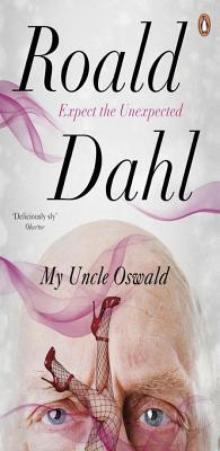 My Uncle Oswald
My Uncle Oswald The Best of Roald Dahl
The Best of Roald Dahl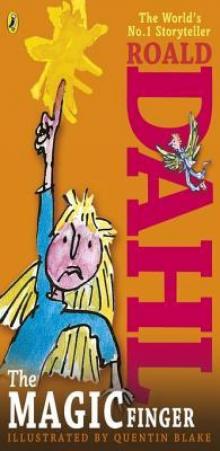 The Magic Finger
The Magic Finger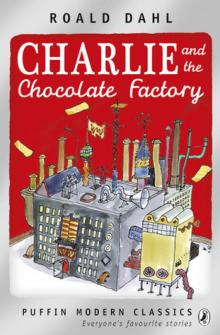 Charlie and the Chocolate Factory
Charlie and the Chocolate Factory Fantastic Mr Fox
Fantastic Mr Fox Matilda
Matilda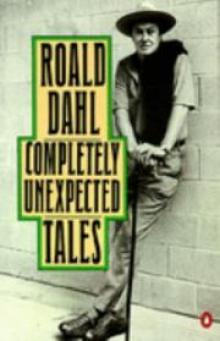 Completely Unexpected Tales: Tales of the Unexpected. More Tales of the Unexpected
Completely Unexpected Tales: Tales of the Unexpected. More Tales of the Unexpected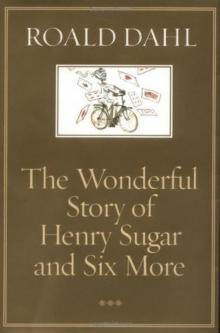 The Wonderful Story of Henry Sugar and Six More
The Wonderful Story of Henry Sugar and Six More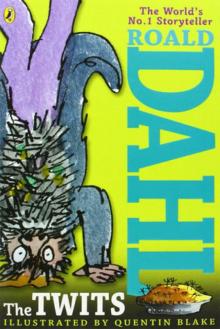 The Twits
The Twits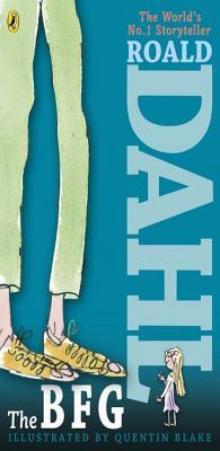 The BFG
The BFG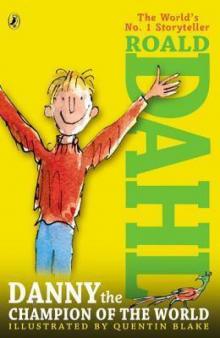 Danny the Champion of the World
Danny the Champion of the World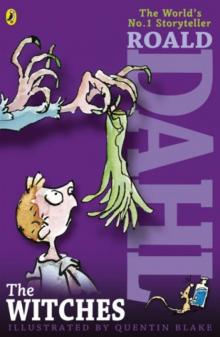 The Witches
The Witches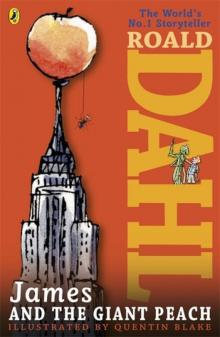 James and the Giant Peach
James and the Giant Peach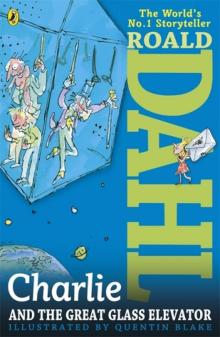 Charlie and the Great Glass Elevator
Charlie and the Great Glass Elevator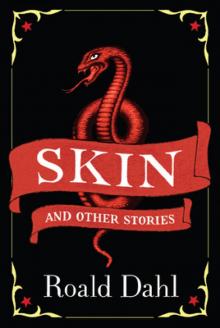 Skin and Other Stories
Skin and Other Stories Kiss Kiss
Kiss Kiss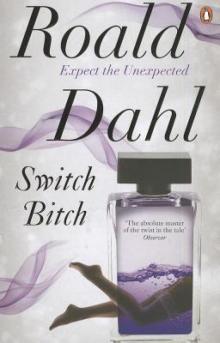 Switch Bitch
Switch Bitch The Giraffe and the Pelly and Me
The Giraffe and the Pelly and Me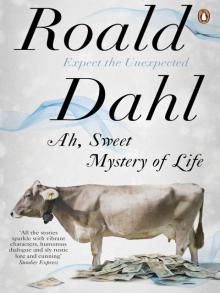 Ah, Sweet Mystery of Life
Ah, Sweet Mystery of Life Fear
Fear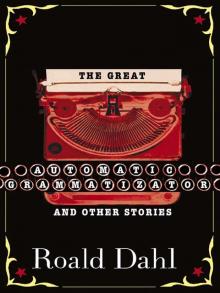 The Great Automatic Grammatizator and Other Stories
The Great Automatic Grammatizator and Other Stories Someone Like You
Someone Like You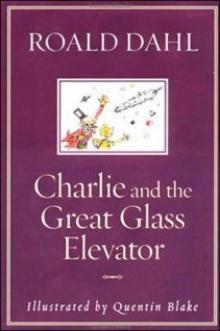 Charlie and the Great Glass Elevator c-2
Charlie and the Great Glass Elevator c-2 More About Boy
More About Boy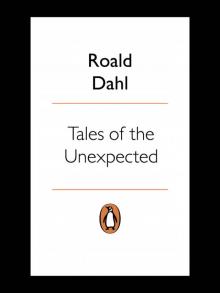 Tales of the Unexpected
Tales of the Unexpected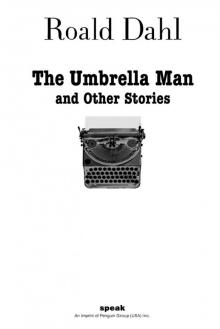 The Umbrella Man and Other Stories
The Umbrella Man and Other Stories Dirty Beasts
Dirty Beasts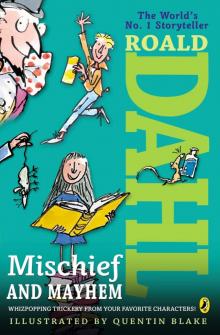 Roald Dahl's Mischief and Mayhem
Roald Dahl's Mischief and Mayhem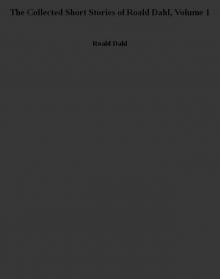 The Collected Short Stories of Roald Dahl, Volume 1
The Collected Short Stories of Roald Dahl, Volume 1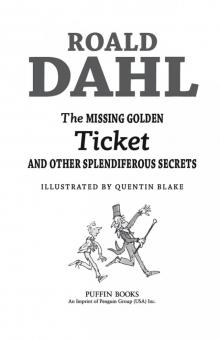 The Missing Golden Ticket and Other Splendiferous Secrets
The Missing Golden Ticket and Other Splendiferous Secrets Billy and the Minpins
Billy and the Minpins Over to You
Over to You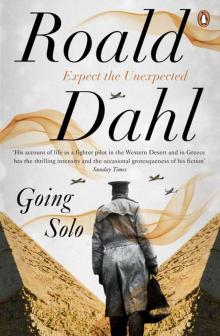 Going Solo
Going Solo Deception
Deception War
War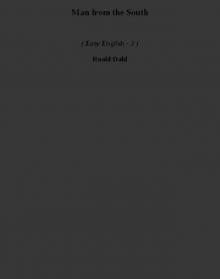 Man from the South ee-3
Man from the South ee-3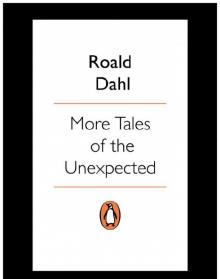 More Tales of the Unexpected
More Tales of the Unexpected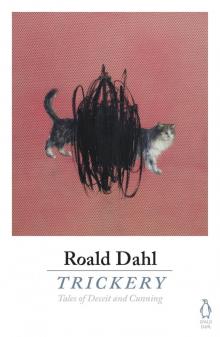 Trickery
Trickery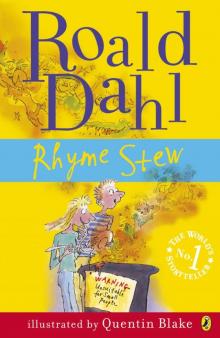 Rhyme Stew
Rhyme Stew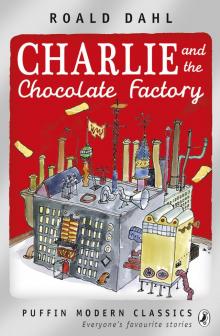 Charlie and the Chocolate Factory (Puffin Modern Classics relaunch)
Charlie and the Chocolate Factory (Puffin Modern Classics relaunch)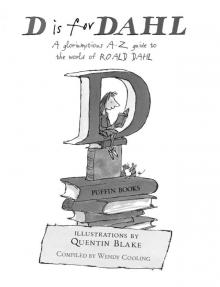 D is for Dahl
D is for Dahl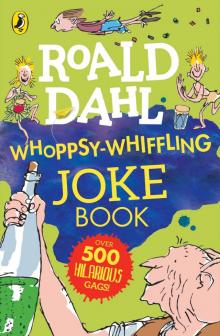 Roald Dahl Whoppsy-Whiffling Joke Book
Roald Dahl Whoppsy-Whiffling Joke Book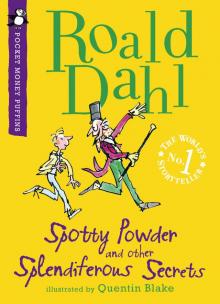 Spotty Powder and other Splendiferous Secrets
Spotty Powder and other Splendiferous Secrets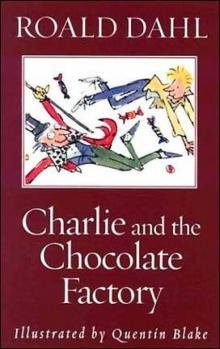 Charlie and the Chocolate Factory c-1
Charlie and the Chocolate Factory c-1 Boy
Boy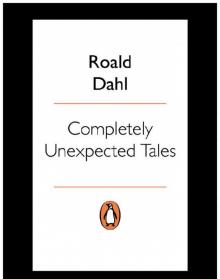 Completely Unexpected Tales
Completely Unexpected Tales Madness
Madness Innocence
Innocence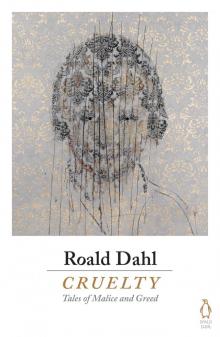 Cruelty
Cruelty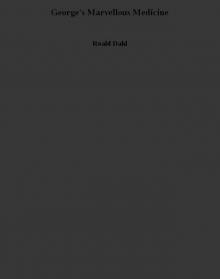 George's Marvellous Medicine
George's Marvellous Medicine